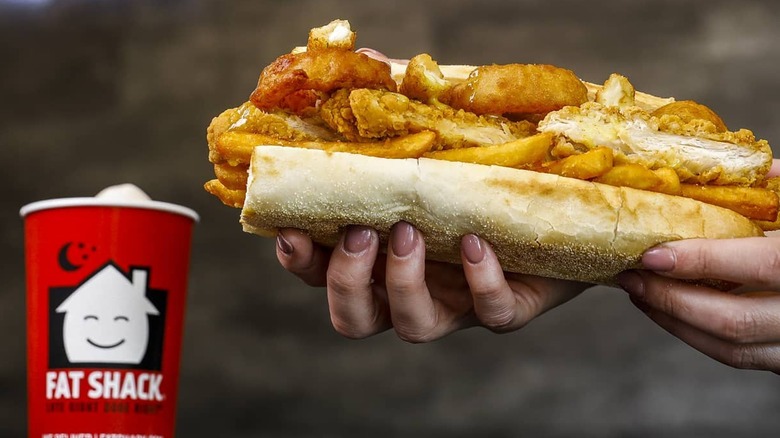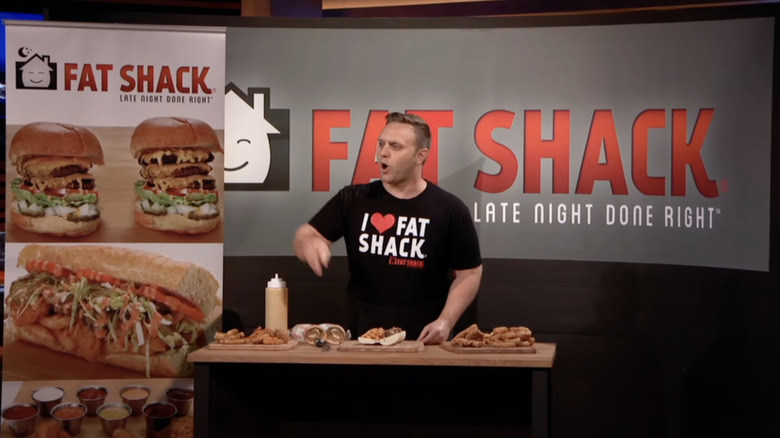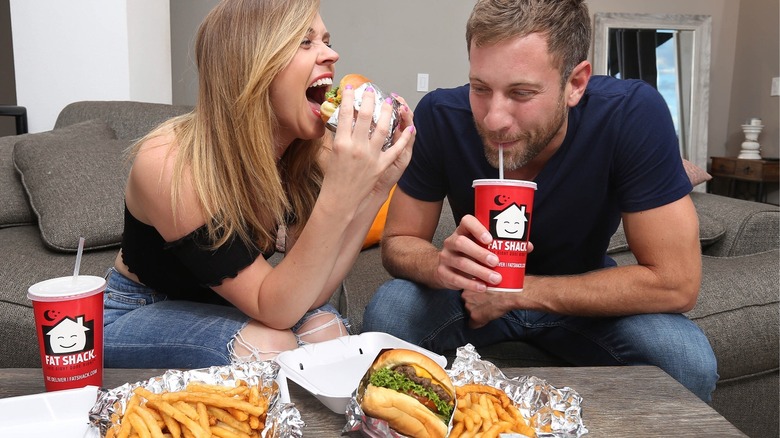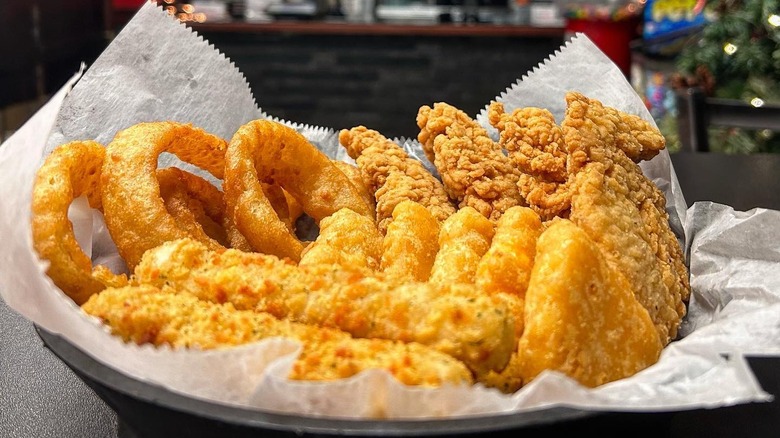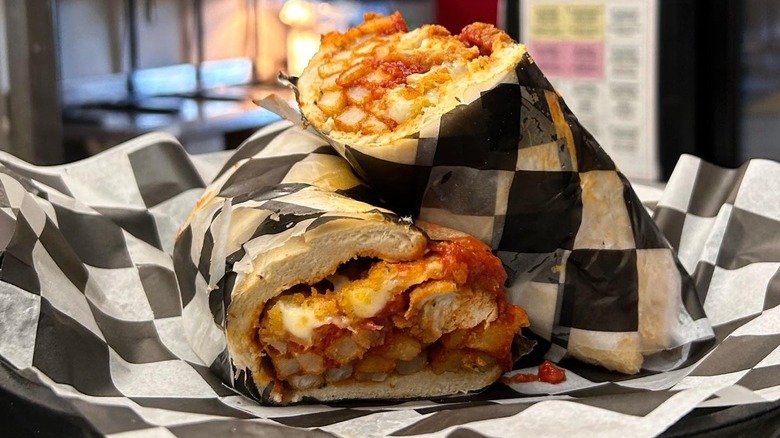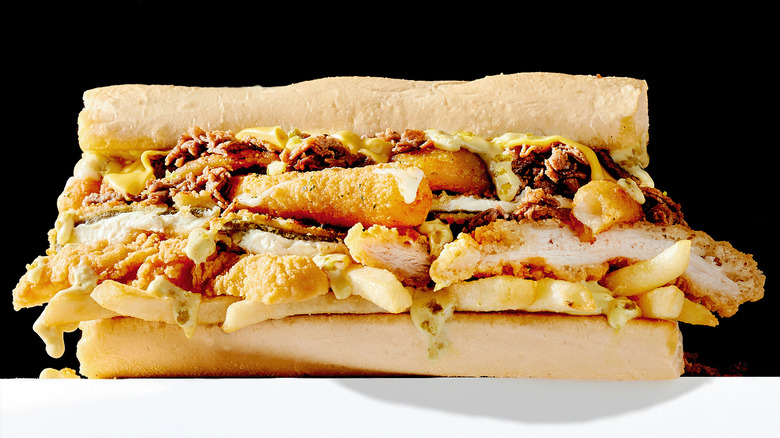Fat Shack: Here's What Happened After Shark Tank
The owners of Fat Shack, Tom Armenti and Kevin Gabauer, appeared on the Season 10 finale of "Shark Tank," asking the Sharks to invest in their fast food restaurant chain. The former fraternity brothers already had an established business, but wanted someone to help them grow their edgy concept into new markets.
In 2010, Armenti, a recent graduate of The College of New Jersey, started Fat Shack after noticing that his alma mater lacked suitable late-night snacking options after partying all night. In contrast, students at nearby Rutgers University waited in line for food trucks serving huge, greasy, Jersey-style sandwiches piled high with fried foods.
With $5,000, Armenti subleased a ghost kitchen from a bagel shop after hours, blanketed his college campus with paper menus, and delivered his "fat" sandwiches to students until 4 a.m. By August 2011, Fat Shack outgrew the shared space and relocated to Fort Collins, Colorado, home of Colorado State University. The first brick-and-mortar Fat Shack was an instant success, bringing its colossal Jersey-style sandwiches to a much larger college town.
Seeing the immediate potential, Armenti brought on college friend Gabauer to revamp and grow the business, opening a second location within six months in Boulder, Colorado. By 2015, the company was franchising, and by the time they went on "Shark Tank" in 2019, Fat Shack reported $22 million in sales with 11 locations, but Armenti and Gabauer had bigger dreams.
What happened to Fat Shack on Shark Tank?
Tom Armenti and Kevin Gabauer appeared on "Shark Tank" on May 12, 2019, effortlessly pitching their concept and giving the Sharks a taste of what they were selling. Armenti and Gabauer sought an initial investment of $250,000 in exchange for 7.5% of their business.
Sharks Lori Greiner and Robert Herjavec immediately passed on the investment opportunity, while "Mr. Wonderful" Kevin O'Leary and Daymond John showed interest. Surprisingly, Mark Cuban was the one who made the deal after initially dismissing the company, saying he only invested in healthy food. However, Armenti and Gabauer eventually convinced Cuban to diversify his portfolio with this unapologetic "cheat meal" option and accepted Cuban's offer of $250,000 for 15% of the business (per YouTube).
In the past, deals have changed or fallen through after filming, but Armenti says Fat Shack's agreement with Cuban is precisely what viewers saw on the show. Discussing their experience on the podcast "Outside The Tank," Gabauer and Armenti spoke of their unique challenges on "Shark Tank," like needing to prepare a fresh meal minutes before pitching. They had confidence in their pitch since they were eight years into their successful business but knew they needed to serve the Sharks an unforgettable meal if they expected a deal. Ironically, the chaos of last-minute frying and tripping the small kitchen's breakers kept the duo too distracted to get nervous, and they nailed it when they pitched to the panel.
Fat Shack after Shark Tank
Since Fat Shack owners Tom Armenti and Kevin Gabauer only had 11 locations and weren't able to sell product outside of the physical restaurants, they were unsure how the publicity of "Shark Tank" would affect their business. Within the first month of airing, however, they received 3,000 requests for Fat Shack franchises that their corporate team of six people total (including them) sorted through, and then responded to interested parties.
Despite the initial deluge, within two years of appearing on "Shark Tank," only a few of those requests became actual Fat Shack franchises. Gabauer and Armenti told the "Outside the Tank" podcast they are very selective when choosing franchisees and have turned down millions of dollars in requests, scaring off most people to find owners tough enough to handle the industry.
While they want to grow the business, they are focused on long-term growth rather than rapid success, ensuring the restaurants that open today will remain in a few years and believing the operator is the ultimate determinant of whether the location will succeed.
The deal with Shark Mark Cuban immediately gave the franchise credibility, allowing it to expand more effortlessly, especially in Texas, where Cuban lives. Building owners were more willing to lease to a company associated with Cuban, and perspective investors had more confidence in their business plans. Cuban's team opened doors for Fat Shack and remains actively involved with the business, exchanging weekly emails with Armenti and Gabauer.
Is Fat Shack still in business?
Fat Shack's presence on social media helps the brand stay connected to its customers by posting mouthwatering food photos and videos. The menu contains the typical bar food like chicken wings and sweets, including unforgettable fast food milkshakes and deep-fried Oreos. However, the "fat sandwiches" keep Fat Shack customers engaged. Fat Shack also has a line of merchandise, including various hats, hoodies, shot glasses, and T-shirts.
Its namesake sandwich, the "Fat Shack," stuffed with cheesesteak, chicken fingers, jalapeño poppers, mozzarella sticks, french fries, crispy onion rings, and honey-jalapeño mustard sauce, keeps fast metabolisms happily coming through the door. Another popular one is the "Fat Doobie," topped with chicken fingers, french fries, onion rings, mozzarella sticks, and honey mustard; naturally, it's heavily promoted around 4/20.
Of course, Fat Shack stays true to its New Jersey roots. It even occasionally adds indulgent fried dishes dripping in sauce with clever names to its menu, so keep an eye out.
What's next for Fat Shack?
While massive fast-food franchises dot the globe, Fat Shack found its sweet spot, appealing directly to college-aged night owls. In 2021, Restaurant Business placed the company on its "Buzzworthy Brands" list, where it shared the spotlight with companies like Pokéworks and Salt & Straw. The publication cited Fat Shack's 26% average sales growth since 2018 and noted that it expanded its locations by a third in 2020, with each restaurant averaging $620,000 in sales.
As of June 2025, there are 30 Fat Shack locations in 13 states — Colorado, Florida, Georgia, Illinois, Kansas, Missouri, Nevada, Oklahoma, Oregon, Pennsylvania, Tennessee, Texas, and Washington, with a new location coming soon in Sioux Falls, South Dakota. According to Kona Equity data, Fat Shack's 2024 annual revenue is estimated at $17,543,000, with an impressive 777.1% growth rate since its first quarter in business.
The former fraternity brothers told "Outside The Tank" they attribute their success to their synergy, balancing each other's skills. As the idea man, Tom Armenti says he's full of energy but always running late and rarely prepared, whereas Kevin Gabauer is organized and reliable — the exact relationship they had in college.
Despite their personal success, when the store manager left the Fort Worth location (in Cuban's backyard), Armenti didn't hesitate to roll up his sleeves late at night, deep frying and mopping the floors to keep that location successful. They are still committed to the success of each franchise location, working double-duty to prove it.
Fat Shack celebrates its 15-year anniversary
Six years after its "Shark Tank" appearance, Fat Shack celebrated its 15-year anniversary in February of 2025. Now a full-fledged fast food chain in its own right, Fat Shack has started looking for ways to offer better deals to its customers and even get involved in eating challenges.
While it might seem strange for a place called Fat Shack to have started a "5K Challenge," it has nothing to do with running a 5-kilometer race. Instead, the restaurant is offering customers a chance to win a $50 gift certificate if they can eat 5,000 calories' worth of Fat Shack food in just 15 minutes. The challenge is open to anyone 18 or older at participating locations between November 9, 2024, and December 31, 2025. The top 10 Challengers nationwide will qualify to compete in a separate 5K race, where they could potentially win up to $5,000 in cash prizes.
Additionally, Fat Shack's menu now features "Fat Stacks," a series of $5.99 items aimed at those looking for smaller portions of the restaurant's famous bites. Options include the original Chicken Stack, a Jalapeño Chicken Stack, and the Mozzy Stack, consisting of mozzarella sticks and marinara sauce on a brioche bun. Each order comes with a smaller portion of value fries on the side, ensuring even these value-priced menu items can fulfill anyone's late-night cravings. Additionally, to properly celebrate its 15th year of business, Fat Shack is reducing the cost of a single menu item on the 15th of every month in 2025 to just 15 cents.

